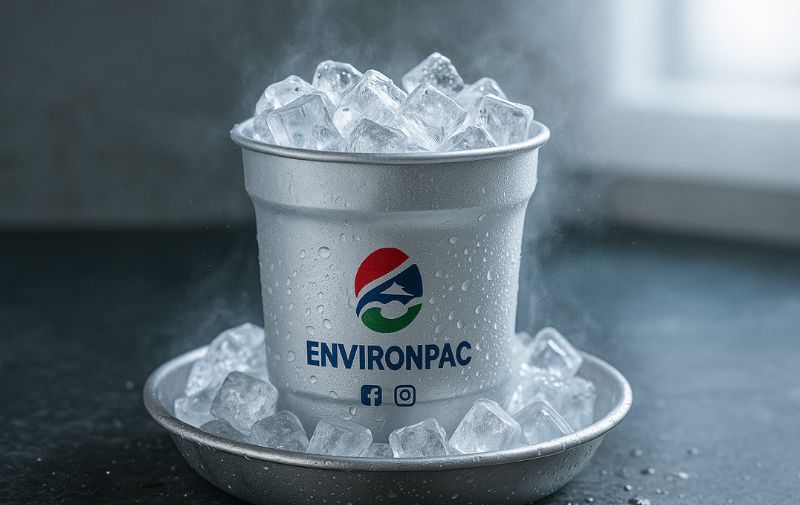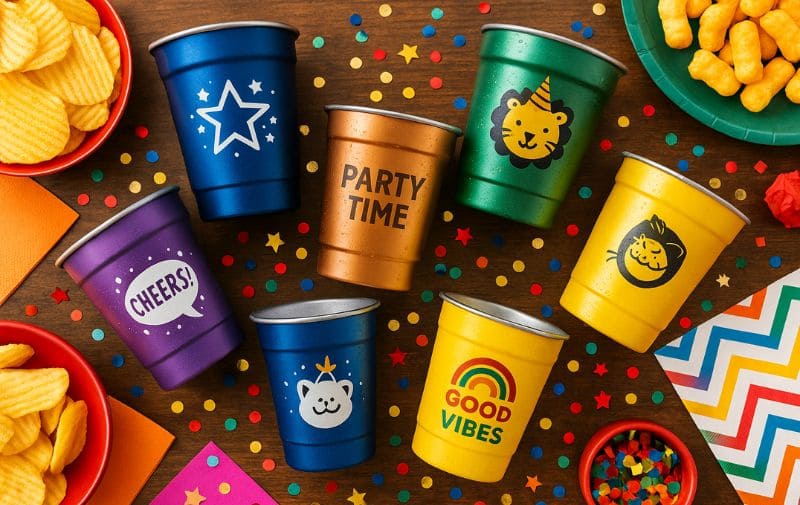Are you worried that drinking from aluminum cups might affect your health? With the rise of aluminum drinking cups, concerns about leaching, taste, and long-term health effects have sparked heated debates online. Conflicting information can leave you unsure of what’s safe. Are aluminum cups safe for you and your family?
Yes, drinking from aluminum cups is generally safe. Coated cups prevent leaching, and exposure from drinkware is far below levels considered harmful by health authorities like the FDA and EFSA.
Curious to know more? This comprehensive guide covers everything from the science of aluminum leaching to tips for using aluminum coffe cup and aluminum beer cup drinkware safely.
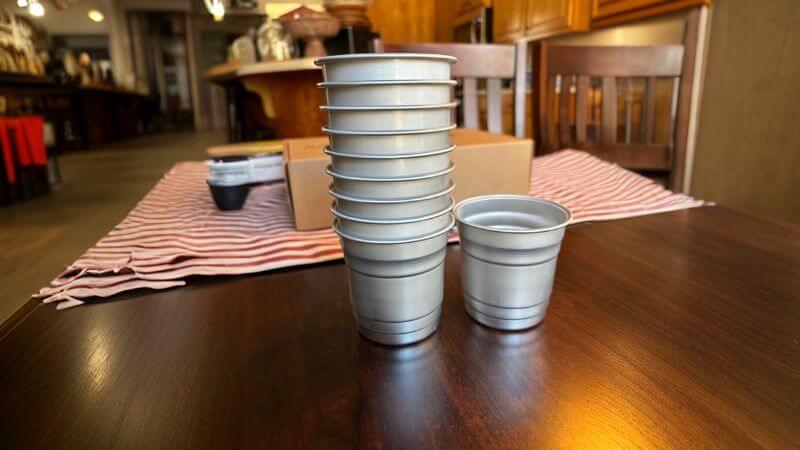
What Are Aluminum Cups Made Of?
Aluminum cups are made of a kind of aluminum known as ‘food grade’ which is approved for use in making containers and cups. Food grade aluminum is different from the normal type as it has undergone processes to meet the requirements of authorities such as FDA and EFSA. It is because this type of aluminum is strong, lightweight and non-corrosive which makes it very useful.
Most aluminum cups such as aluminum coffee cups are coated with a plastic layer that protects them from damage. There are several reasons for this. The first is that some people complain of taste when aluminum is used in its bare form. It also acts as a barrier making the can less reactive with the drink which decreases the chance of the drink metallic in flavor.
Uncoated aluminum cups are available but they are generally referred to as bear aluminum cups. There’s a potential for them to leach, especially non-alcoholic drinks that contain high levels of acidity, lemon juice or soda. But on the use of good quality aluminium cups such as 16 oz cups or aluminum cup 32 oz are deemed safe and come coated with BPA.
Aluminum cups come in a variety of sizes and types, each designed for specific uses:
| Type | Description | Use Cases |
|---|---|---|
| Aluminum Solo Cups | Lightweight, disposable drinkware | Parties, picnics, casual events |
| Aluminum Beer Cups | Larger, reusable cups (16-32 oz) | Beer, cocktails, large events |
| Aluminum Coffee Cups | Coated for hot beverages (9 oz) | Coffee, tea, hot drinks |
| Aluminum Drinking Cups | Standard size for most drinks | Water, soda, beer, mixed drinks |
| Aluminum Party Cups | 9 oz – 32 oz available for events | Stadiums, concerts, promotional |
Each type of aluminum cup has its own unique purpose. Aluminum solo cups are lightweight and disposable, often used at parties, while aluminum beer cups are designed for larger, more durable usage, often at stadiums and festivals. Whether you need a lightweight option or a more robust, reusable solution, aluminum cups offer a variety of choices.
How Does Aluminum Affect the Body?
Does the Body Absorb Aluminum?
Aluminium is a common additive found in tobacco and food items, which begs the question, does the body absorb aluminium?
The general belief that the Human body absorbs aluminum in excess is unfounded. When we consume beverages or food items that have traces of aluminum, the human body digests it and most of it gets naturally disposed of, whereas very little is absorbed. Moreover, even when the body manages to absorb tiny aluminium particles, it is naturally detoxified from the body with the help of the kidneys. When aluminium is consumed, the digestive system makes sure aluminum particles pass through with ease, retaining less than 1 percent of the particles.
Is exposure to aluminum considered hazardous to human health?
A misconception that needs addressing is the idea that aluminum is directly connected to neurological illnesses, more specifically Alzheimer’s disease. Although studies have characterized individuals who have been exposed to aluminum to have a higher risk of developing Alzheimer’s disease, everyday aluminium exposure through cookware or a cup is ruled out for causing long term damage to the human brain.
To add to the last argument, aluminum consumed through the use of a cup is far more lower than aluminum found in food products. In actuality Baked goods, tea leaves and even Vegetables are proven to contain a higher concentration of aluminum in them according to numerous dietary studies as compared to a drinkware. For context, a person may ingest 20 mg of aluminum per week from food alone, while drinking from aluminum cups adds a negligible amount.
How Much Aluminum Exposure is Too Much?
According to World Health Organisation (WHO) and European Food Safety Authority (EFSA) the tolerable weekly intake (TWI) value of aluminium is 1 mg for every Kg person weighs. In simple terms, an individual whose body weight is 70 kg or 154lb should be able to consume 70mg of aluminium every week. In real life situations though, however, the average intake is well below the recommended level. Majority of the aluminum we take is from food because how it’s organically sourced instead of from drinkware.
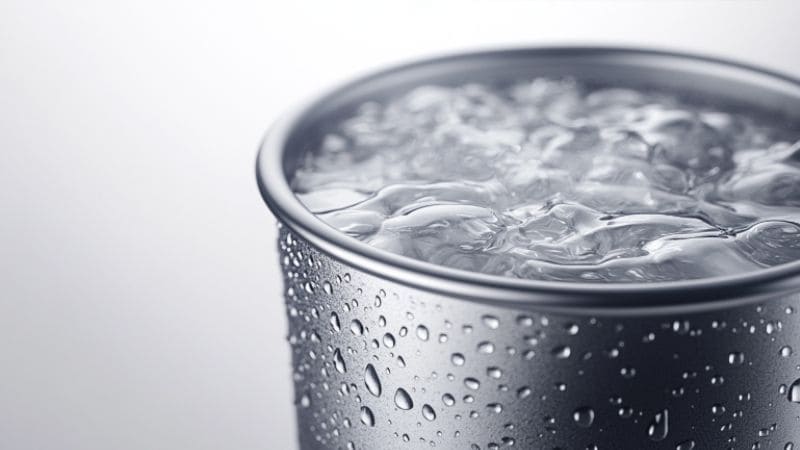
The Protective Barrier: How Aluminum Cups Prevent Leaching
The Aluminum Oxide Layer
Aluminium has the tendency of forming aluminum oxide layer if met with air which serves as an excellent barrier coat in terms of aluminium cups. This layer is made up of great strength while being very thin and non viewable. This acts as a perfect barrier or an invisible coat to the metal core and stops the metal from leaking into any fluid. Such types of mechanisms happen naturally and don’t require any type of chemical interventions. Therefore, most of the non-coated aluminium cups come along with some level of fortified protection.
Coated Aluminum Cups
Coatings have now been employed in manufacturing in order to add an extra layer of protection, which subsequently renders aluminum cups BPA free. Not only does this coating limit the chances of leaching to the minimum, but it also resolves the problem of a metallic flavor contained in beverages. The liner is food-grade and is intended to comply with regulations.The coating also facilitates the cleaning of the coated surfaces, as it is scratch-resistant and abrasion-resistant.
Why Coated Cups Are Safer
- Prevents Direct Metal Contact: The coating prevents aluminum from being exposed that would allow a number of beverages contact with pure aluminum.
- Eliminates Metallic Taste: The aluminum flavor contained in brewed espresso does not get absorbed as a result of coating being done.
- Reduces Leaching Risk: The coating also acts as a barrier against leaching even when using an acidic drink
Scientific Support for Coated Cups
A few studies mentioned above refer to coated aluminum drinkware as safe and non-toxic with some stating these coatings are extensively used. It has been observed that coated cups are safe in use with acidic beverages, such as orange juice and soda because uncoated aluminum might leach some quantities of metal. Coatings also increase the cup’s lifespan, which would render them more durable and therefore able to be used more times.
Can Aluminum Leach Into Your Drink?
When and How Does Leaching Occur?
Leaching happens when substances from a material, like aluminum, seep into food or beverages. just a note that aluminum cups have a protective oxide layer, which can be compromised in certain conditions and increase the risk of leaching. Acidity, temperature and the length of time in contact can compromise the natural oxide barrier, permitting small amounts of aluminum to seep into the beverage.
Acidic drinks like lemonade, soda and juices, for example, are known to promote leaching potential. That is because acidic liquids can eat away at the oxide layer more quickly than neutral liquids, such as water or milk. Likewise, exposure to high temperatures can speed up this process, which is why a lot of manufacturers advise against using uncoated aluminum coffee mugs for hot beverages.
Research Studies on Leaching
One of the more well-known studies performed an analysis of coffee brewed in aluminum moka pots. The amount of aluminum that leached into the coffee was about 0.3 mg per liter. For reference, the European Food Safety Authority (EFSA) sets a tolerable intake at 1 mg per kilogram of body weight per week, so this quantity is comfortably low compared with the safety threshold.
| Drink Type | Risk of Leaching | Recommendation |
|---|---|---|
| Water | Low | Safe for aluminum cups |
| Lemonade | High (acidic) | Use coated cups |
| Soda | High (carbonic acid) | Use coated cups |
| Coffee | Moderate (heat) | Use coated cups or insulated cups |
| Tea | Low | Safe for aluminum cups |
How to Prevent Leaching
- Use Coated Aluminum Cups: Coated cups provide a barrier that prevents metal from touching the liquid.
- Avoid Storing Acidic Beverages for Long Periods: Acidity can erode the protective oxide layer.
- Don’t Use for Hot Drinks: Stick to aluminum coffee cups with a heat-resistant lining.
- Follow Manufacturer Instructions: Some aluminum cups are dishwasher-safe, but washing by hand preserves the coating.
Health Concerns About Aluminum Cups
Are Aluminum Cups Linked to Alzheimer’s Disease?
For years, rumors circulated that aluminum exposure was linked to Alzheimer’s disease, but this claim has been widely debunked. Organizations like the Alzheimer’s Association have stated that no significant evidence links aluminum exposure from drinkware, cookware, or deodorants to Alzheimer’s. In fact, modern studies reveal that the body’s natural detoxification processes prevent small amounts of aluminum from accumulating in the brain.
Do Aluminum Cups Cause Cancer?
No scientific evidence supports a link between aluminum cups and cancer. Concerns likely stem from confusion about aluminum found in antiperspirants, which have also been deemed safe for human use. The World Health Organization (WHO) has not classified aluminum drinkware as a cancer risk.
Are There Other Health Risks to Consider?
Some minor concerns include:
Metallic Taste: Uncoated aluminum cups may give a “metallic” taste to beverages, but this taste is harmless.
Leaching with Acidic Drinks: As discussed earlier, acidic drinks can increase leaching. However, proper use of BPA-free coated cups eliminates this issue.
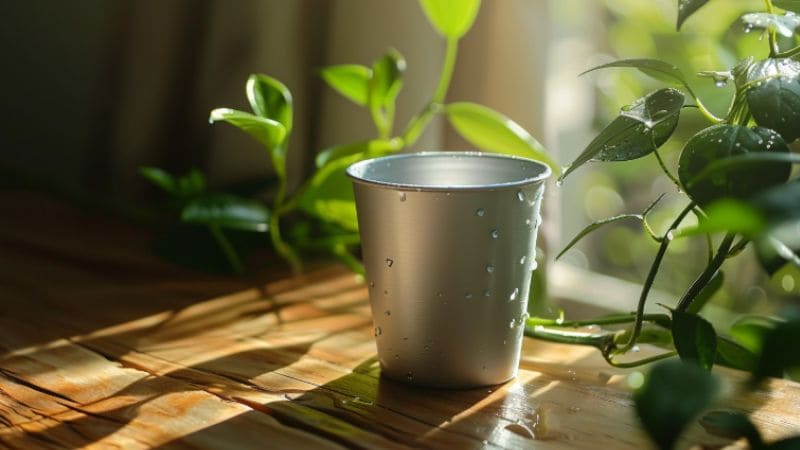
Are Aluminum Cups Safe for Children and Babies?
Can Children Drink from Aluminum Cups?
Yes, Aluminum cups can be utilized by children without any issue as long as the cups are lined or coated with relevant food grade protection. Although kids may be sensitive to metallic flavors the coating resolves this problem.
What else can Kids Cup be Made of?
For children aged less than 3 years, parents may opt for using silicone, stainless steel or BPA free plastic cups. These materials would be less likely to shatter and are ideal for infants and toddlers. But for older children, covered agitation-coated aluminum cups are convenient and environmentally friendly options.
What are the Best Aluminum Kid’s Cups?
- Ask for Food-Grade Certification: Ensure the cup meets regulatory standards.
- Choose Coated Cups: To cope with leaching and metallic taste.
- Opt for Child-Safe Sizes: Ensure that the cups are less than 16 oz, it would be easier to hold in smaller hands, such as aluminum cup 9 oz.
Regulatory Perspectives on Aluminum Drinkware
Are Aluminum Cups FDA-Approved?
Yes, aluminum is considered a “generally recognized as safe” (GRAS) material by the FDA for food and drink contact. This classification allows manufacturers to produce aluminum drinkware as long as they follow safety protocols.
What Do European Regulations Say?
The EFSA (European Food Safety Authority) has set a tolerable intake limit of 1 mg of aluminum per kg of body weight per week. Testing of aluminum coffee cups, aluminum beer cups, and aluminum solo cups shows that most of these products do not exceed the allowable exposure limit.
Environmental Benefits of Aluminum Cups
- Recyclability: Aluminum can be recycled infinitely without quality loss.
- Waste Reduction: Using aluminum solo cups instead of plastic prevents waste buildup.
- Reusability: Aluminum cups, especially aluminum beer cups and aluminum cup 32 oz, are durable and reusable, reducing waste.
Comparing Aluminum Cups to Other Drinkware
| Drinkware Type | Durability | Safety | Eco-Friendliness |
|---|---|---|---|
| Aluminum Cups | Strong | Safe with coating | Recyclable, reusable |
| Plastic Cups | Breakable | Can leach BPA | Low recyclability |
| Glass Cups | Fragile | Safe, no leaching | Reusable but fragile |
| Paper Cups | Weak | Often lined with plastic | Not fully recyclable |
How to Use Aluminum Cups Safely
- Avoid Long-Term Storage of Acidic Beverages: Store lemonade, soda, or juice in glass or stainless steel instead.
- Hand Wash When Possible: Although some are dishwasher-safe, hand washing preserves the coating.
- Use Coated Cups: Coatings prevent metal leaching and metallic taste.
- Read Manufacturer Guidelines: Each brand may have unique care instructions.
The Environmental Advantages of Using Aluminum Cups
Aluminum cups provide many environmental advantages over plastic or paper drinkware. One of the biggest benefits is recyclability. Aluminum does not lose its quality when it is recycled, unlike plastic which degrades. Using no new raw materials means that an old aluminum cup can become a new cup, can or product.
Another major win is reduced waste. With aluminum solo cups, you help limit the number of plastic cups going to waste in landfills by swapping them out for parties, events, and get togethers. Plastic waste needs hundreds of years to decompose, but aluminum can be recycled and reused within weeks.
Thirdly, aluminum cups are reusable. Where paper and single-use plastic cups are thrown away after a single use, aluminum cups—like the aluminum beer cups from earlier or the larger aluminum cup 32 oz—are durable and intended for repeated use. This helps in drastically limiting waste generation. Their durability means they are perfect for stadiums, concerts and events, where large crowds would otherwise create mountains of waste.
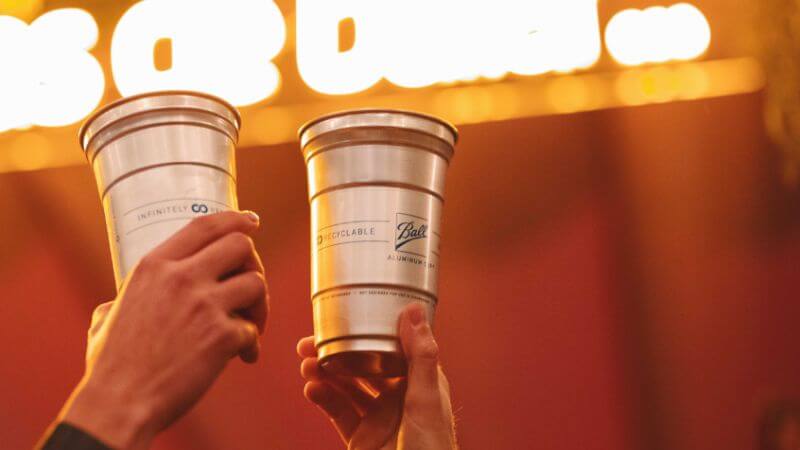
How to Use Aluminum Cups Safely
First, do not store acidic drinks like lemonade, soda or citrus juices in uncoated aluminum cups for long periods of time. The manufacturers warn against putting acidic liquids in aluminum cups, since this increases the risk of having aluminum leach into their contents, especially if they leave it there for a long time. For those drinks, opt for glass or stainless steel instead.
Then, whenever you can, hand wash your aluminum cups. Some aluminum drinkware is advertised to be dishwasher-safe, but the high temperatures and detergents can chip away at that protective coating over time. A hand wash (with mild soap and a soft cloth) will also help preserve the coating, which in turn allows your cups to last longer.
What’s the Benefits of Using Aluminum Cups
One of the top benefits is their health safety. Unlike plastic cups, which may contain harmful chemicals like BPA or phthalates, aluminum drinking cups are free from these toxic substances. This makes aluminum a safer choice for both adults and children.
Another major benefit is durability. Unlike fragile glass or brittle plastic, aluminum drinkware is strong, shatterproof, and long-lasting. The aluminum resuable cup is perfect for everyday use, while the larger aluminum cup 32 oz is ideal for big events or outdoor gatherings where durability is crucial. These cups can withstand drops, knocks, and pressure without breaking.
Finally, aluminum cups are eco-friendly. Not only are they 100% recyclable, but they are also reusable, reducing landfill waste. Every time you use an aluminum cup instead of a disposable plastic or paper cup, you’re helping the environment. Since aluminum can be recycled endlessly without losing quality, the same material can be reused in new products, promoting a circular economy.
Debunking Myths About Aluminum Cups
Myth 1: Aluminum cups are harmful?
Aluminum Cups Give You Alzheimer’s. This is probably one of the most prevalent misconceptions. It started in the 1960s, when very early studies suggested a potential link between aluminum exposure and Alzheimer’s disease. But newer, in-depth studies have debunked this claim. And according to the Alzheimer’s Association, the use of aluminum drinkware has not been linked to Alzheimer’s in any important way.
Myth 2: Aluminum Cups Contaminate With Dangerous Amounts of Metal?
Others think that drinking from aluminum cups may leach harmful amounts of metal into their drinks. But it occurs only under certain conditions, such as if acidic drinks (lemonade or soda) are stored in uncoated cups for extended periods. Several modern coated aluminum cup brands use a BPA-free protective barrier preventing leaching, even with acidic beverages. To ease your mind, stick to cups coated by regulated brands.
FAQs About Aluminum Cups
Are aluminum cups safe to drink from?
Yes, drinking from coated aluminum cups is safe when done so properly. The vast majority of aluminum drinking cups today are coated with food-safe, BPA-free lining, so your drink never comes into contact with raw aluminum.
Can I store soda in aluminum cups?
It’s advisable not to leave soda or other acidic drinks in uncoated aluminum cups for long. Soda has then carbonic and phosphoric acid, which can wear away the aluminum oxide layer over time, which could result in small amounts of leaching. But the coated aluminum cups are a-okay as far as this law goes. That coating keeps the soda from contacting the aluminum, so you can drink your bubbly without a care in the world.
Are aluminum beer cups better than plastic beer cups?
Aluminum beer cups are a far better option than plastic beer cups. They are also more durable, reusable and eco-friendly. Unlike single-use plastic cups that are a leading cause of wastefulness globally, aluminum beer cups are 100% recyclable. Aluminum can be recycled infinitely without any loss of quality, so every aluminum beer cup could potentially be reincarnated into future products.
Conclusion
Drinking from aluminum cups is safe. With proper use of coated, food-grade cups, the health risks are minimal. Aluminum cups offer durability, sustainability, and health safety when used as intended.


